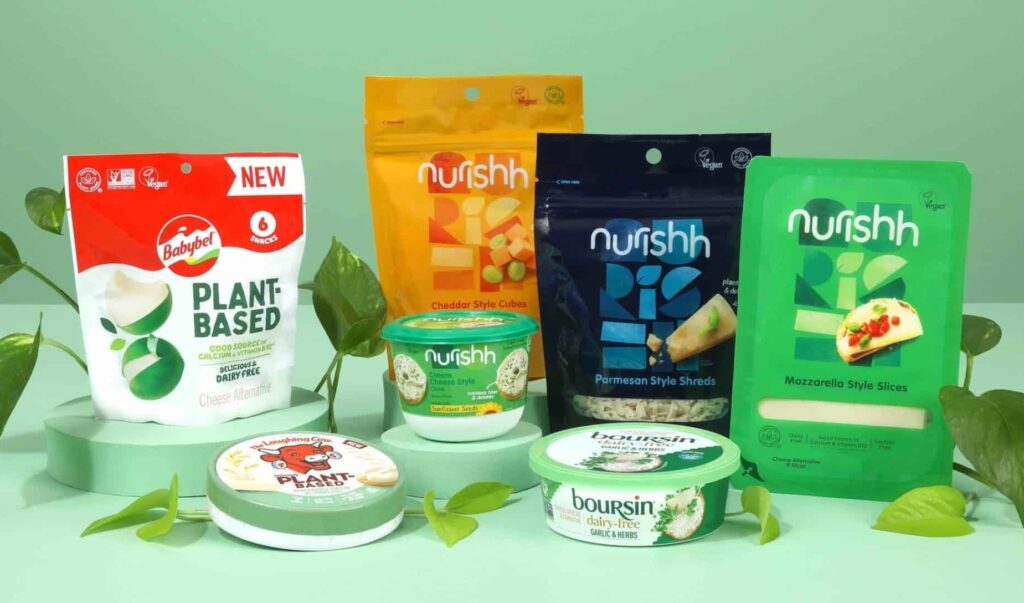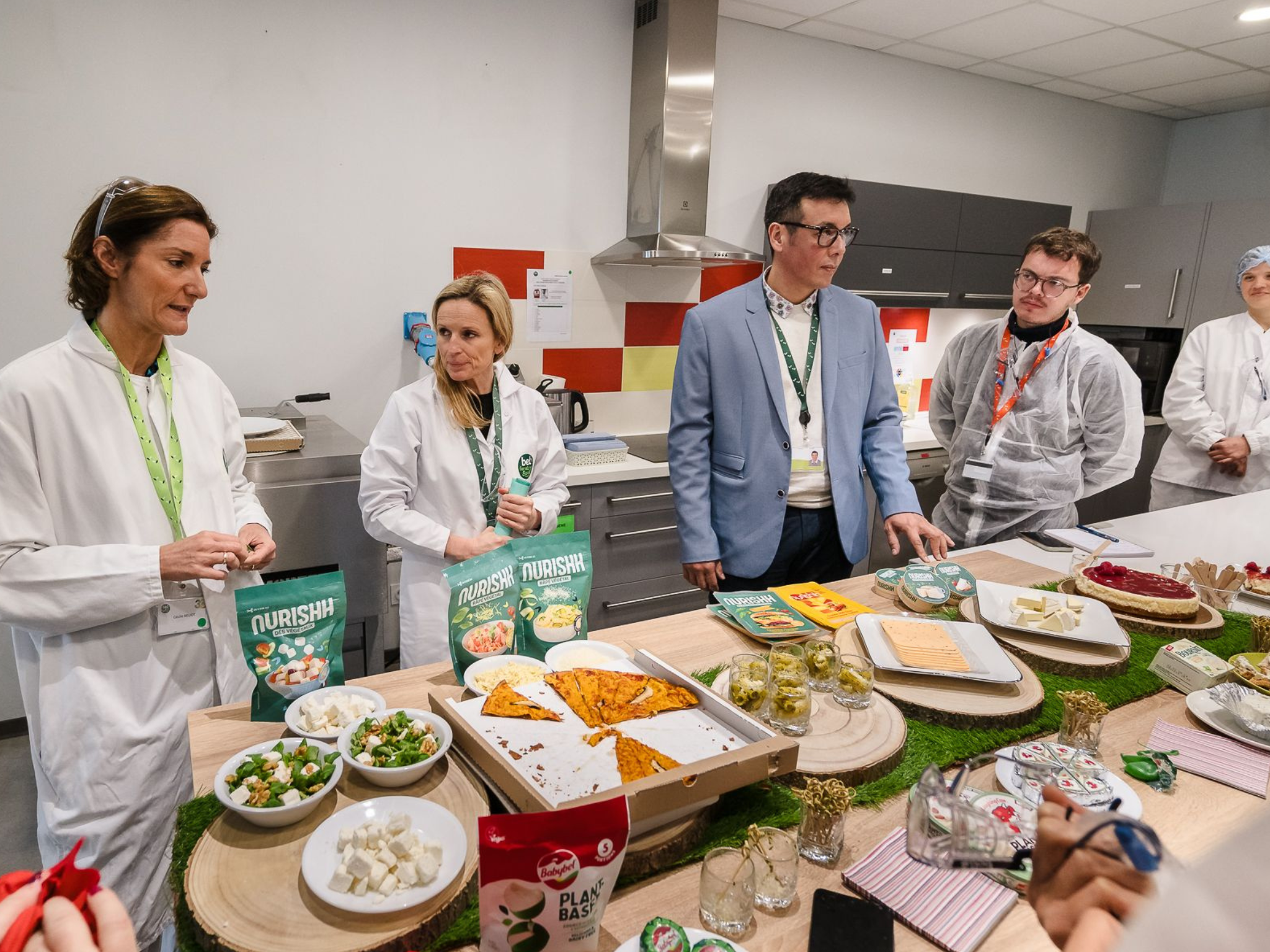Bel Group Embarks on €9M Project Backed by French Govt to Develop ‘Next-Generation’ Vegan Cheese
5 Mins Read
Dairy behemoth Bel Group has partnered with other French food companies on a three-year project to develop better-tasting vegan cheese products.
Bel Group is leading a government-backed effort to enhance the flavour and texture of plant-based cheese through traditional fermentation and ageing processes, all while keeping it minimally processed.
The French dairy giant – owner of brands like Babybel, The Laughing Cow, and Boursin – has linked up with agrifood producer Avril, probiotic manufacturer Lallemand, and foodservice consultant Protial on the three-year Cocagne Project. The products born out of the collaboration will be part of Bel’s existing brands.
The alliance is fuelled by a €9M investment, with support from state-owned bank Bpifrance’s France 2030 programme. The project will be run by Bel at its R&D centre in Vendôme, which was last week injected with €7.5M to expand R&D capacity and strengthen infrastructure in its bid to “shape the future of food”.
“By 2050, we aim to meet global food challenges with products that combine nutrition, pleasure, and sustainability, ensuring our leadership in responsible innovation,” the company told Green Queen.
Cocagne Project to focus on taste, texture and nutrition

The Cocagne Project will centre on creating minimally processed vegan cheese through advanced fermentation and ageing techniques to deliver on consumer expectations for taste and texture, often the major pain points for non-dairy cheese. It will additionally focus on nutrition to cater to the demand for more natural food options.
The companies aim to develop European crops for the vegan innovations, choosing plants with lighter environmental impacts and high nutritional, textural and sensorial attributes. “At Bel, we are committed to leveraging nature’s full potential to innovate sustainably,” the dairy giant explained.
“Our research focuses on alternative ingredients, including plant-based proteins from crops like peas, chickpeas, and fava beans and some others, as well as fermentation-derived proteins, which offer nutritional quality comparable to dairy. These ingredients align with our mission to create high-quality, accessible food with a reduced environmental footprint,” it added.
“In a time when the agrifood industry faces urgent challenges around resource preservation and planetary limits, Bel is committed to offering more sustainable food without compromising on nutrition or taste,” said Bel CEO Cécile Béliot. “Innovation is essential to the future of food.”
This innovation, added R&D head Delphine Chatelin, means delivering products meeting consumers’ nutrition needs, pushing tech boundaries to offer more sustainable packaging, and “addressing the major challenges of the food transition by exploring new solutions, such as our work on alternative proteins”.
“Today, we had the privilege of showcasing our innovations in dairy, plant-based products, and packaging to representatives from French institutions that support us daily,” Chatelin said, referring to the Cocagne Project’s launch at Vendôme centre.
Bel’s investment in the R&D hub – which marked its 30-year anniversary – will go towards mordenising the infrastructure and improving working conditions to foster open innovation and support efforts to share the future of food.
The company says the Vendôme facility is driven by three strategic pillars: product innovation, eco packaging, and plant-based alternatives.
Bel’s latest effort to amp up alternative protein innovation

Bel is one of the world’s oldest and largest cheese producers – it has been around since 1865, and in the first six months of 2024, it raked in €1.8B in sales (a 2.3% increase on the corresponding period last year).
This also means it has a high climate footprint, leading the company to commit to reducing its emissions by 25% come 2035 (from a 2017 baseline). Part of that effort includes a goal to make half its portfolio plant-based by the end of the decade, which it says would cut its carbon impact “in parallel with efforts in sustainable dairy practices and operations”.
In 2020, the company also announced that it planned to release vegan versions of cheese from each of its core brands – so far, it has rolled out non-dairy options under Babybel, Boursin, The Laughing Cow, and Nurishh in several markets.
While these products only make up a small share of Bel’s cheese sales, it is working towards a target of generating 50% of its sales from vegan alternatives and fruit-based offerings by 2050.
The Vendôme centre hosts “pioneering projects” to develop plant-based alternatives, as well as fermentation-derived proteins. In fact, the company has a deeper focus on biomass and precision fermentation, representing a class of products that have attracted more attention from investors than other alternative protein pillars this year.
To advance these efforts, the group has formed strategic partnerships with universities and organisations like Polytechnique Montreal, Wageningen University and INRAE, as well as startups like Standing Ovation (in which it’s an investor) and Superbrewed. And last year, it invested in US startup Climax Foods to develop vegan cheese using AI and data science.
Meanwhile, its Nurishh brand already has a line of animal-free cream cheeses on the market, made from Perfect Day‘s precision-fermented whey protein.
“Our ambition to balance our portfolio with 50% dairy and 50% plant-based products by 2030 reflects our dedication to addressing both consumer demand and environmental responsibility,” said Bel. “To achieve this, we are developing fruit- and plant-based [products], diversifying our sources of protein, investing in cutting-edge fermentation technologies, and forming strategic partnerships with innovators such as Standing Ovation and Superbrewed.”
Bel’s Cocagne Project comes at a time when cheese is the fastest-growing plant-based category in France, with sales growing by a third between 2022 and 2023, reaching €10M, according to Circana data for the Good Food Institute Europe.



